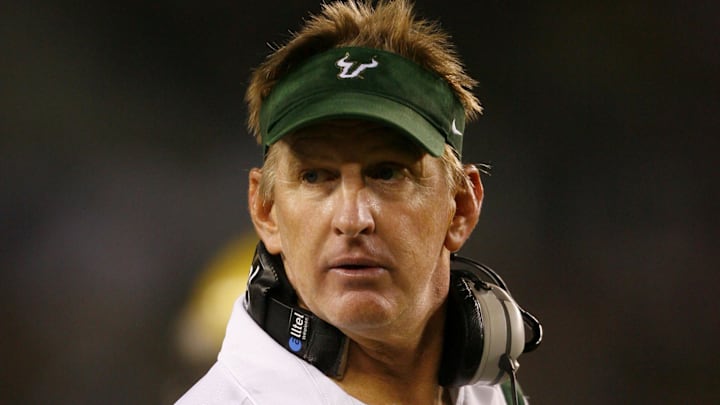USF announced on Monday that Jim Leavitt will join four others – including men’s basketball coach Amir Abdur-Rahim – in the school’s athletic hall of fame.
Leavitt built USF football from nothing into a team that defeated three Top 10 teams en route to a 95-57 record in 13 seasons. That’s what the university is rewarding.
Your 2025 South Florida Athletics Hall of Fame honorees. 🏅
— USF Athletics (@USFAthletics) June 2, 2025
📝: https://t.co/7jx6DkKtfv#HornsUp 🤘 pic.twitter.com/2iBHEEtT4M
However, we know what happened after that.
He was accused of grabbing a player by the throat and striking him. In a different era, he might have gotten away with that, but standards were changing. What once could be brushed aside as “aw, it’s just football” could no longer be ignored.
He was an old-school coach who had to follow new-school rules. He couldn’t do it.
Brett McMurphy, my former colleague at the Tampa Tribune, broke the original story, which led to an immediate outcry and investigation by USF.
Leavitt might have even survived that with a fine and suspension if he had admitted it. He didn’t. Even worse, there was evidence he tried to interfere with the investigation.
He was fired in January 2010.
I was a sports columnist at the Trib then, and I supported the firing.
But I figure if Major League Baseball can forgive Pete Rose, enough time has passed to welcome Leavitt back to the flock.
I used to vote for the MLB Hall of Fame. One of the standards I followed was to ask if you could tell the history of the game without including that person.
It’s the same way with Leavitt. You can’t tell the story of USF football without including him.
To say he was fiery doesn’t come close to describing how intense he was. Sometimes, too much.
Everyone remembers he led USF to a No. 2 national ranking in 2007. What happened next, however, doesn’t come up as often.
The Bulls went to Rutgers for a nationally televised game. They were the best story in college football at the time, no question.
But running off the field at halftime, he snapped at a sideline reporter trying to get a comment, leading studio hosts to shake their heads and wonder just who this guy was.
It was the first of three straight losses for USF. That became the norm.
The Bulls typically had fast starts under Leavitt, only to fade when they entered conference play. The Bulls never finished better than 4-3 in the Big East under Leavitt, and were 17-18 in the five seasons he coached them in conference.
That, too, is part of the story. His tenure was not as good as some like to remember, but not as bad as others make it out to be.
The bottom line is this: If he had been USF’s second coach instead of its first, he wouldn’t be considered for the Hall. But he built a program from scratch and put it on the map with few facilities and administrative leadership that often didn’t fully grasp how big-time football works.
It's complicated, but he deserves the recognition USF just gave him.
